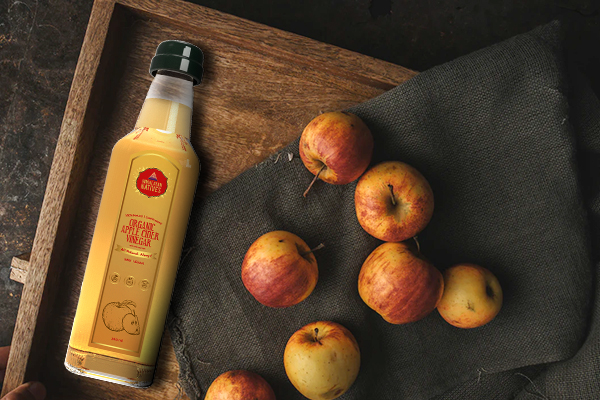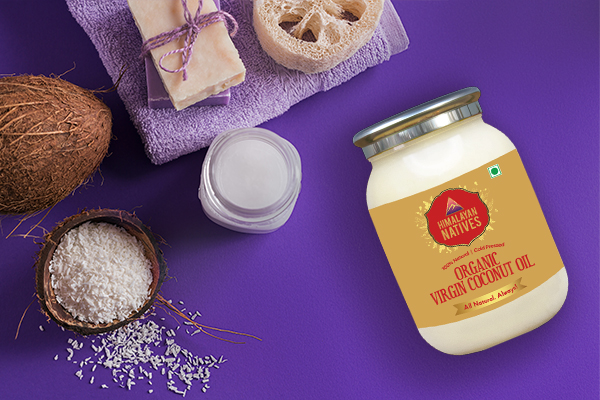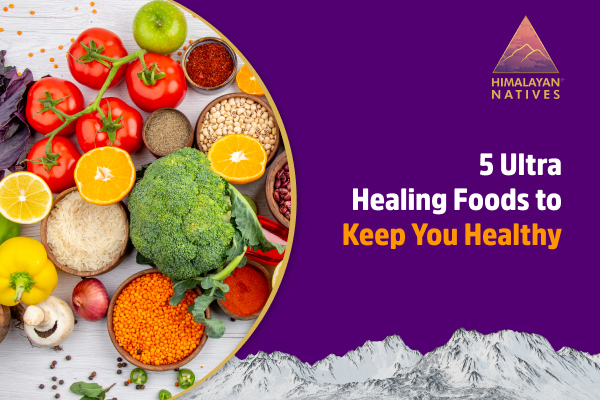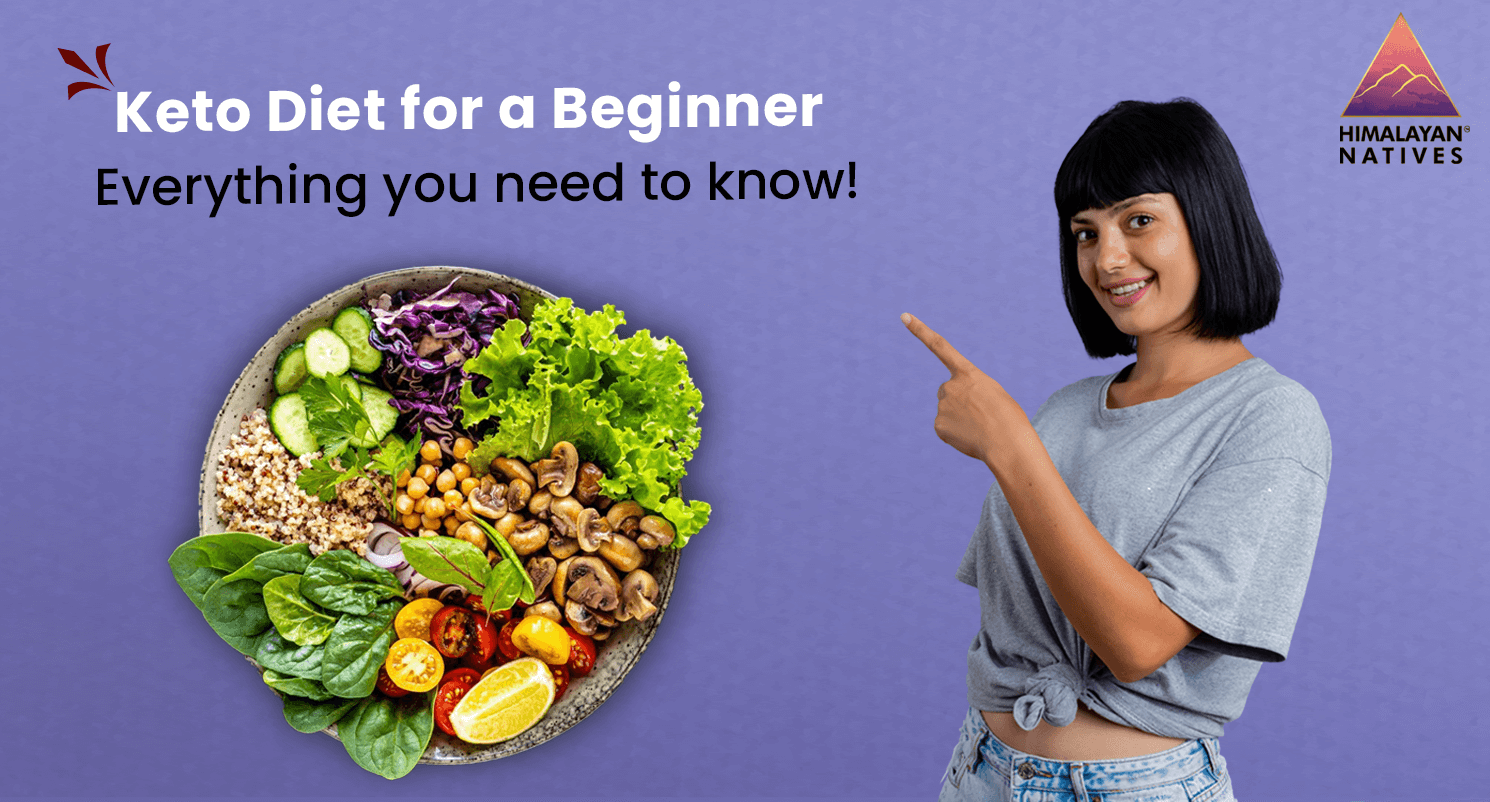
With promises of weight loss, increased energy, and even improved mental health, the Keto diet has taken the world by storm.
And Keto diet for beginners, it can all seem a bit like climbing a mountain with a blindfold.
But hey, worry not, because this blog is going to be your sherpa guide to the keto summit!
We'll cover everything you need to know, from what ketosis is to making a healthy, yummy and sustainable keto diet meal plan that suits you the best.
As Joan Rivers correctly said, 'Diets, like clothes, should be tailored to you.'
And thankfully, with Himalayan Natives' range of natural food products, you have all the pieces you need to customise your keto chart.
What is Keto Diet?
Keto diet focuses on achieving a state of ketosis, where the body basically shifts from using glucose as its primary energy source to burning fats. This demands drastically reducing the intake of carbs while increasing the consumption of protein and healthy fats. By understanding the science behind ketosis, one can better appreciate the diet's mechanisms.
Imagine your body as a car. Traditionally, it runs on glucose, the fuel extracted from carbohydrates. In the keto diet, we drastically reduce carbs (to 20-50 grams per day) and replace them with protein (70-80% of your calories).
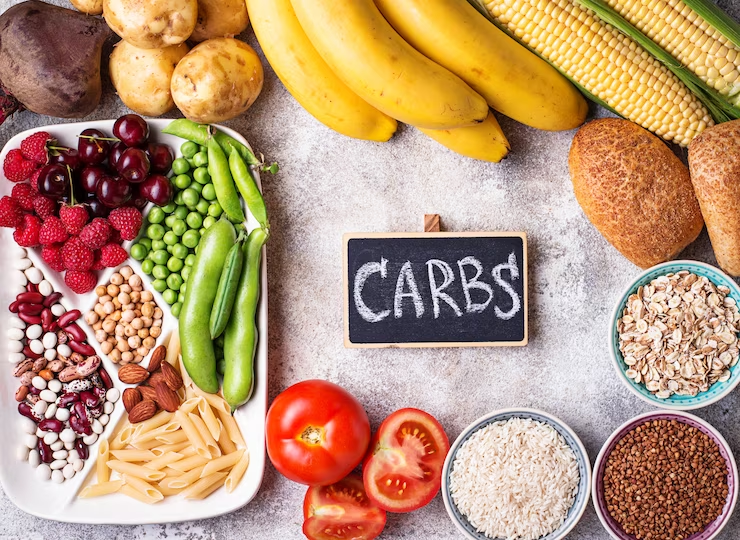
This shift throws your body into a metabolic state called ketosis, where it starts burning fat for fuel instead. Ketones, produced by the liver from fat and protein from muscles, become your new temporary sources of energy.
But before starting your Keto diet journey and its benefits, let’s find out if this is the right choice for your health goals or do you really need to follow the Keto diet!
Who Should Adopt a Keto Diet? Is Keto the Right Fit for You?
The keto diet's immense rise has left many wondering: "Should I be doing this too?"
While its potential benefits are compelling, it's not a one-size-fits-all solution.

Let's explore who might benefit from keto and who might want to consider alternative approaches.
Candidates for Keto:
Individuals seeking Weight Loss: Keto can be a powerful tool for weight management, especially if you struggle with insulin resistance or type 2 diabetes.
Athletes seeking Improved Performance: Studies suggest keto may enhance endurance and performance in specific sports, though more research is needed.
People with Epilepsy: Keto diet has been used effectively as a therapeutic intervention for certain types of epilepsy, particularly in children.
Those with Metabolic Disorders: In some cases, keto can help manage specific metabolic disorders like polycystic ovary syndrome (PCOS).
However, keto may not be ideal for everyone:
Pregnant or Breastfeeding Women: The safety of keto during pregnancy and breastfeeding is inconclusive, so consulting a doctor is crucial.
People with Kidney or Liver disease: Keto can place stress on these organs, so individuals with existing conditions should proceed with caution.
Those with Eating Disorders: The restrictive nature of keto can be triggering for individuals with a history of eating disorders.
People taking certain Medications: Keto may interact with some medications, so consulting your doctor before starting is essential.
If Keto’s not something for you, maybe you just need this: 5 Healthy Habits to Start Your Fitness Journey Today!
With that doubt out of the way, let's move on to the benefits and tips for a perfect Keto diet.
Keto Diet Benefits, Advantages & Disadvantages
To start with, let’s understand how this diet can benefit you in several ways:
Weight Loss: Keto often leads to significant weight loss due to reduced calorie intake and increased fat burning.
Improved Blood Sugar Control: Keto can be helpful for managing type 2 diabetes by lowering blood sugar and insulin levels.
Reduced risk factors for Heart Disease: Keto may improve cholesterol levels and lower blood pressure, potentially reducing the risk of heart disease.
Increased Energy Levels: Many people report feeling more energised on keto, likely due to the sustained energy provided by fat burning.
Improved Mental Clarity: Some studies suggest keto may improve cognitive function and focus, although more research is needed.
Keto Diet Advantages:
Simple and sustainable: Keto can be a straightforward approach to weight management and doesn't require calorie counting.
Variety of delicious foods: The keto world is full of creative and satisfying recipes, making it anything but boring.
Improved health markers: Many people experience positive changes in blood sugar, cholesterol, and blood pressure on keto.
Keto Diet Disadvantages:
Initial side effects: Transitioning to ketosis can cause the "keto flu" with symptoms like fatigue, headaches, and nausea.
Social challenges: Eating out and attending social events can be trickier on keto.
Nutrient deficiencies: It's essential to choose nutrient-rich keto foods to avoid deficiencies.
Start Keto Diet Right with These Tips!
Before getting on with your keto journey, be wise and consult your doctor if you have any underlying health conditions. If not, below listed are four things you should be mindful about.
Set realistic goals: Start by focusing on small, achievable goals like eliminating sugary drinks or incorporating more keto-friendly fats into your diet.
Plan your meals and snacks: Stock your pantry with keto staples like meat, fish, eggs, cheese, nuts, seeds, and non-starchy vegetables.
Track your macros (optional): Use online tools or apps to track your carbohydrate, protein, and fat intake to ensure you're hitting your target ratios.
Stay hydrated and supplement electrolytes: Drink plenty of water and consider electrolyte supplements, especially in the beginning.
Keto Food List for Beginners
Foods to Eat on Keto:
Healthy Fats: Avocado, Olive oil, Coconut oil, and Desi Cow Ghee.
Protein-Rich Foods: Lean meat and eggs.
Low-Carb Vegetables: Leafy greens, broccoli, cauliflower, and Seeds, including chia and pumpkin seeds.
Dairy: Cheese, Yoghurt and Desi Cow Ghee in moderation.
Dry Fruits & Nuts: Almonds, Cashews
Berries: While most fruits are limited to keto, berries like strawberries, blueberries, and raspberries can be enjoyed in moderation.
Pair them with Raw Multifloral Honey for a natural, low-carb sweetness.
Foods to Avoid on Keto:
Grains: Bread, pasta, rice, cereal, tortillas
Sugary Drinks: Soda, juice, sports drinks, sweetened coffee
Starchy Vegetables: Potatoes, corn, peas, beans
Fruits (except some berries): Apples, bananas, grapes, oranges
Legumes: Lentils, chickpeas, black beans
Processed Foods: Packaged snacks, chips, candy, pastries
Keto Friendly Seeds and Dry Fruits:
While you'll be saying goodbye to many fruits, some low-carb options can enhance your keto journey. Berries like raspberries, blueberries, and strawberries are bursting with antioxidants and fibre, making them perfect keto-friendly snacks.
And for a satisfying crunch, reach for Keto-friendly Seeds like pumpkin, sunflower, chia, and hemp. These nutrient powerhouses are rich in fibre, healthy fats, and essential minerals, adding variety and texture to your diet.
Common Mistakes and Challenges You Might Face
Electrolyte Imbalance: Keto can lead to electrolyte imbalances, hence, it's vital to monitor and supplement when necessary.
Keto Flu: Recognizing and managing symptoms like fatigue and headaches is essential during the initial adjustment phase.
Staying Consistent: Consistency is key in reaping the benefits of the keto diet. Common pitfalls include not tracking macros, inadequate hydration, and overlooking hidden carbs.
While navigating the keto landscape, Himalayan Natives can be your trusty guide. Our commitment to natural, sustainable ingredients aligns perfectly with the keto ethos or any diet for that matter. We offer 100% natural food products to fuel your journey without compromising on taste or quality.
Remember, the keto journey is unique for everyone. Listen to your body, experiment with different foods and recipes, and don't be afraid to tweak your approach to find what works best for you.
With the right support, a dash of Himalayan magic, and a healthy dose of self-compassion, you can conquer the keto summit and reach your wellness goals.
Beyond this blog, we also share healthy tips, recipes and natural foods over our Facebook & Instagram pages daily.
So, pack your keto backpack, lace up your boots, and let's climb the keto mountain together!
Frequently Asked Questions on Keto Diet:
1. What foods can I eat on a keto diet for beginners?
Answer: A beginner-friendly keto diet includes high-fat and low-carb foods. Consider avocados, fatty fish, meat, eggs, and incorporate Himalayan Natives' natural products like Desi Cow Ghee, Raw Honey, and seeds.
2. How do I create a keto meal plan as a beginner?
Answer: Start by focusing on whole, nutrient-dense foods. Plan meals around protein sources, healthy fats, and low-carb vegetables. Include Himalayan Natives' range for added nutrition and flavour.
3. Are there any side effects of starting a keto diet?
Answer: Some people might experience the keto flu during the initial transition, which may include fatigue and irritability. Stay hydrated, ensure electrolyte balance, and consider a gradual approach to minimise these effects.
4. Can I include nuts and seeds in my keto diet?
Answer: Yes, certain nuts and seeds are keto-friendly. Include almonds, cashews, and keto-approved seeds in moderation for added crunch and nutrition while staying within your carb limit.
 HELPFUL0 people found it helpful
HELPFUL0 people found it helpful
Related Blogs
Subscribe to Our Blogs
and never miss on the latest update!










